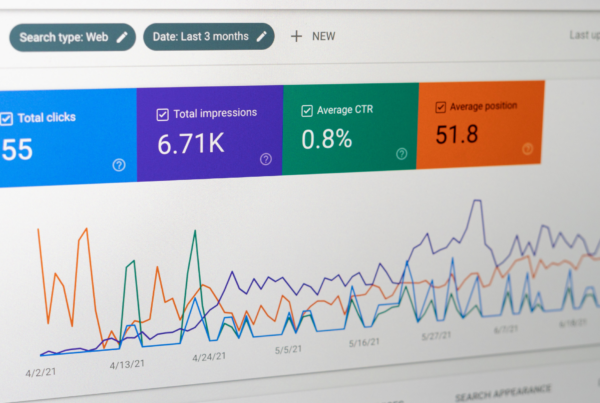In 2025, building an SEO-optimised website that converts is not just about ranking high on search engines. It’s about delivering a seamless, engaging experience that turns visitors into loyal customers. As search engines evolve and user expectations rise, staying ahead of the curve is vital.
This article will show you how to optimise a website for SEO in 2025, focusing on strategies that drive tangible results.
Article Contents
Focus on User-Centric Design
User experience (UX) is the backbone of any SEO strategy. Google’s Core Web Vitals, which measure page speed, responsiveness, and visual stability, remain critical in 2025. However, great design is about more than just meeting technical benchmarks. It’s about delighting your visitors and making their journey effortless.
To achieve this, prioritise a mobile-first design, ensuring your site performs flawlessly on smartphones and tablets. Streamline navigation by keeping menus intuitive, reducing the clicks needed to reach key information. Accessibility is also a growing focus. Tools like WAVE can help ensure your website meets accessibility standards for all users. These enhancements not only improve your rankings but also increase engagement and conversions.
Conduct Smarter Keyword Research
The way users search has changed significantly in the last 5 years. In 2025, conversational queries and intent-based searches will dominate, meaning businesses must adapt their keyword strategies. AI-powered tools such as Semrush, Ahrefs, and Google Trends make identifying high-value keywords more efficient.
Rather than targeting broad, competitive terms, focus on long-tail keywords that align with specific user intents. For example, instead of “SEO services,” you might target “how to optimise a website for local SEO.” Predictive tools can also help you uncover seasonal trends and emerging topics, giving your content a competitive edge. By understanding what your audience is searching for and why, you can capture traffic more likely to convert.
Create Useful, High-Quality Content
Content remains king in 2025, but more than publishing relevant information is needed. Search engines and users expect genuinely helpful, actionable, and engaging content. Thin content or generic blogs won’t cut it; your content must add real value.
Start by addressing common pain points or questions your audience has and providing in-depth solutions. Incorporate media, such as videos, infographics, and downloadable guides, to make your content more engaging. Remember to keep your content fresh by regularly updating articles with the latest data, trends, and insights. Additionally, FAQ sections optimised with schema markup can improve your chances of appearing in featured snippets, which are prime real estate on search engine results pages (SERPs).
Optimise On-Page SEO
On-page SEO fundamentals continue to play a critical role in driving visibility and clicks. While meta titles, descriptions, and headers are still important, 2025 demands that they work harder to engage users and align with search intent.
Create compelling meta titles under 60 characters that focus on primary keywords and spark curiosity. Write informative yet concise meta descriptions, encouraging users to click. Structured data (schema markup) is essential for providing additional context to search engines and enhancing your SERP appearance with rich results, such as star ratings, FAQs, or product details. Lastly, internal links should be used strategically to guide users through related content clusters, improving user experience and site structure.

Leverage Technical SEO for Speed and Crawlability
A technically sound website is critical for SEO in 2025. Google’s emphasis on site speed and crawl efficiency means that slow-loading, poorly structured websites will need help to compete.
Start by optimising your site’s speed using Content Delivery Networks (CDNs), compressing images, and enabling lazy loading for non-essential elements. Ensure your site is fully secure with HTTPS, an essential requirement for building trust and ranking well. Regularly conduct technical audits with tools like Screaming Frog to identify crawl errors, broken links, and duplicate content. These steps will improve your rankings and create a smoother, more enjoyable user experience.
Build Trust with E-E-A-T (Experience, Expertise, Authoritativeness, Trustworthiness)
In 2025, Google will place even greater emphasis on E-E-A-T as a core ranking factor. Websites that demonstrate first-hand experience, expertise, authoritativeness, and trustworthiness are more likely to rank and convert.
To enhance E-E-A-T, publish content authored by industry professionals or experts with clear credentials. Include author bios to showcase their experience and credibility. Focus on building high-quality backlinks from reputable sources in your niche—these signal authority to search engines. Transparency is equally important:
- Maintain a detailed “About Us” page.
- Include a clear privacy policy.
- Ensure your contact information is easy to find.
By demonstrating reliability, you’ll not only rank better but also gain the trust of your visitors.
Optimise for Conversions with CRO
Driving traffic to your website is only half the battle—converting that traffic into leads or sales is where the real value lies. Conversion Rate Optimisation (CRO) ensures your SEO efforts translate into measurable results.
Start using tools like Hotjar or Crazy Egg to analyse user behaviour and identify friction points. A/B test different calls-to-action (CTAs) to see what resonates most with your audience. For example, test whether “Request a Free Consultation” performs better than “Get Started Today.” Include social proof, such as reviews, testimonials, and trust badges, to build confidence and encourage conversions. A well-placed testimonial next to a form or checkout button can make all the difference.
Monitor Trends and Continuously Improve
SEO constantly shifts and is always looking to improve, and 2025 is no exception. Staying informed about trends and adapting your strategy is crucial to maintaining a competitive edge.
Perform regular SEO audits—ideally every quarter—to identify and fix technical or content-related issues. Follow trusted sources like Search Engine Journal to monitor Google’s algorithm updates. Experiment with emerging technologies, such as voice and visual search, which are gaining traction. These proactive measures will ensure your website remains relevant and practical.
Build an SEO-Optimised Website That Converts in 2025
Building an optimised website that converts in 2025 requires more than technical know-how. By focusing on user-centric design, more thoughtful keyword strategies, high-quality content, and E-E-A-T, you’ll create a website that ranks well, builds trust, and drives conversions.
Pair this with regular audits, CRO techniques, and a commitment to staying ahead of trends, and your website will become a powerful asset for your business.
Ready to take your website to the next level?
Get in touch with Progress Digital today for expert SEO guidance and tailored solutions.




